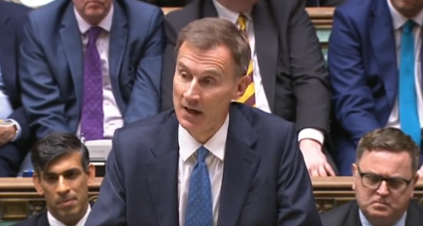Measures unveiled in the government’s Autumn statement are set to fuel a surge in demand among charities, which are already tackling a high level of need from their communities and cuts to their income, a think tank is warning.
Chancellor of the Exchequer Jeremy Hunt’s Autumn Statement this week contained tax cuts for businesses and self-employed workers as well as plans to strengthen benefit sanctions against unemployed people unable to find work.
But think tank Pro Bono Economics is warning that the statement does not address a real terms cut in public spending and signals "a renewed period of austerity".
It says that Hunt's Statement has effectively “signed off on a £19bn a year real terms reduction in spending on public services” by 2028, that will leave charities facing an increase in demand.
“The combination of continued stagnation in incomes and real-terms cuts in public services is likely to fall heaviest on the people who have already been most exposed to the economic and health challenges of recent years,” warns Pro Bono Economics chief executive Matt Whittaker.
He is particularly concerned around Office of Budget Responsibility (OBR) projections that an additional 85,000 people will fall into unemployment relative to its March projections.
Based on the OBR’s projections Whittaker says that “charity sector income is likely to be £9bn lower than the pre-Covid trend”.
Another worry is that the share of household income being used to make debt repayments is set to double, reaching 8.3% by 2028.
“The nation’s charities will undoubtedly step in to support this group at the sharp end, as they have done through a succession of recent crises,” said Whittaker.
“The charity sector has already been running hot while dealing with the triple threat of elevated demand, higher costs and falling donations. This precarious balancing act is set to continue.”
Disability charities and organisations have already raised concerns that Hunt’s announcement around benefit sanctions will adversely impact unemployed with disabilities and long-term health conditions.
This move by the government is likely to further fuel demand for support, warns Whittaker.
“With three-quarters of people referred to food banks known to be disabled or living with someone with a disability, changes to work capability assessments - cutting support for 371,000 people by up to £390-a-month - are only likely to heighten this demand,” he said.
Latest News
-
Regulator issues warning to charity over social media post that appeared to support Hamas
-
Profile: Donna-Marie Edmonds
-
Charities' income and expenditure margin narrowest in five years, data shows
-
Caron Bradshaw: The future of risk management
-
£4m charity fund launched to bolster financial resilience
-
New report reveals the highs and lows of UK charity management since 2020
Charity Times video Q&A: In conversation with Hilda Hayo, CEO of Dementia UK
Charity Times editor, Lauren Weymouth, is joined by Dementia UK CEO, Hilda Hayo to discuss why the charity receives such high workplace satisfaction results, what a positive working culture looks like and the importance of lived experience among staff. The pair talk about challenges facing the charity, the impact felt by the pandemic and how it's striving to overcome obstacles and continue to be a highly impactful organisation for anybody affected by dementia.
Charity Times Awards 2023
Mitigating risk and reducing claims

The cost-of-living crisis is impacting charities in a number of ways, including the risks they take. Endsleigh Insurance’s* senior risk management consultant Scott Crichton joins Charity Times to discuss the ramifications of prioritising certain types of risk over others, the financial implications risk can have if not managed properly, and tips for charities to help manage those risks.
* Coming soon… Howden, the new name for Endsleigh.
* Coming soon… Howden, the new name for Endsleigh.
Better Society

© 2021 Perspective Publishing Privacy & Cookies











Recent Stories